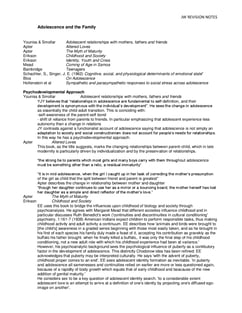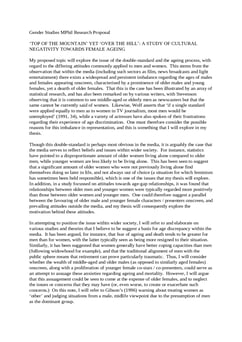Sociology Notes Wadham College, University Of Oxford Sociology Notes
Description
These notes were written during my final year at Oxford and cover some of the classic themes in sociology from a quantitative perspective, and thus may also be of use to economists, political scientists and social policy students. In the exam I got a 79 (the top mark in the year), and five of the six essays below are also firsts.
Essay 1: industrialisation and social mobility (3500 words)
The first essay discusses whether the process of industrialisation is causally related to social mobility - a key claim of the liberal theory of industrialisation. I argue that the initial onset of industrialisation increases social mobility, primarily due to changes to the occupational structure. However, since the pace of industrialisation slows, social mobility stabilises or can even fall. I reject several arguments made by the liberal theorists, such as the idea that the association between origin and destination weakens during industrialisation. I do offer some adaptations of the liberal theory, such as the idea that geographic mobility, itself arguably a consequence of industrialisation, may drive increases to mobility. I end by stressing the relative unimportance of social fluidity.
Essay 2: marriage and relationships (4000 words)
The second essay concerns the apparent decline in marriage rates across developed societies. I argue that marriage rates have, if we ignore the anomaly of the immediate postwar era, only declined slightly, that the decline is mostly decline in marriage rates for black women, and that the more significant phenomenon is the delay in average age at first marriage. I attempt to explain each of these phenomena, and generally find economic arguments preferable to 'value change' driven accounts.
Essay 3: Religion and secularisation theory (3300 words)
This essay is a defence of secularisation theory. I critique four of the most significant challenges thereto - the 'believing without belong' theory, the alleged robustness of religion in
the USA, the 'true religion' theory, and a set of theories based in demography.
Essay 4: interpersonal ties (3000 words)
The fourth essay is an extended attack on one of the most popular ideas in the sociology of interpersonal ties, and one of the most cited papers of all time in the social sciences - Mark Granovetter's notion of the 'strength of weak ties'. Firstly I will suggest that weak ties look artificially valuable, but that on a per capita basis they are less so. Secondly I suggest that, for all the strength of weak ties (Hereafter, SoWT) thesis may have held in the past, important aspects of the modern job-search process weaken the argument. Thirdly I suggest that the life-cycle point at which a tie is formed may be more important than the intensity of the tie, and may exert a confounding influence on the SoWT thesis. Fourthly I suggest that, perhaps counter-intuitively, it is weak bridging ties which are harder to cultivate/develop, which, as argued above, means that even if the crude SoWT holds, its implications are at least partly undermined.
Essay 5: ethnic minorities and labour markets (2000 words)
The fifth essay is on the experience of ethnic minorities in the labour market, although much of the discussion could be adapted to explain women's experience in the labour market. I analyse three puzzles: 1) cross-national differences in the general magnitude of the ethnic penalty 2) why 'involuntary minorities' such as indigenous Canadians, have worse labour market outcomes than 'voluntary minorities' and finally, why in some countries the penalty operates primarily in terms of risk of unemployment, whereas in others it also operates in terms of reduced access to the salariat. In the course of this essay I develop what I believe to be a novel argument about a problem with audit tests, considered to be the gold standard proof of discrimination.
Essay 6: education (2000 words)
The final essay considers a common argument regarding social mobility - that it is increased by the expansion of education (it would be helpful to read this essay alongside the first essay in this pack). I suggest the relationship is more complex than that. Firstly, I suggest that the relationship may be merely correlatory, or that causation may run in the opposite direction. Secondly, I critique the argument that expansion increases mobility because of the waning gap between transition odds for working and middle class students at more advanced levels of education. I suggest that transitions cannot, especially in the UK, be considered independent of one another, and that there are selection effects in operation. This all implies an alternative to the popular 'life course perspective' model of educational transitions.
Ask the author a question
Sociology of Developed Societies Notes
What is included?
- This product contains 7 documents
- Approximately 52 pages
Highlights
- Grade: First - 79
- Institution: Wadham College, University Of Oxford (unaffiliated)
- Country: United Kingdom
- Level: Undergraduate
Trusted By Top Students
Instant Download
24/7 Support
Our picks for you
2 itemsWhy Oxbridge Notes?
Written by the top 1% of students and often the top 0.1%. Drastically improve your chance of a first.
Quality, not quantity. Our founder, an Oxford law graduate, compared over ten thousand note sets to find the best ones created in the last decade. We've filtered out the crap.
86% of customers are repeat customers. People can't get enough of our notes.
Concise yet comprehensive notes–save tens of hours of tedium.
Money back guarantee if the notes do not match description. Partial money back if core topics are missing.
Established company–in business since early 2010 and trusted by hundreds of thousands of students.
Completely anonymous. We never tell authors or anyone else who bought notes.
Reviews Of Our Notes

“The best place to start your readings as you can build a basic infrastructure out of them, rather than blindly dive into pages and pages.” Student, University of Oxford

“I have found the Oxbridge notes to be a really effective aid to my revision, they were thorough, up to date and relevant to my subjects, and were the main contributing factors to my exam success, very powerful tool.” Student, University of Manchester

“No unnecessary information... Oxbridge Notes cut to the chase and are more than sufficient to do well in exams.” University of Southampton, Singapore

